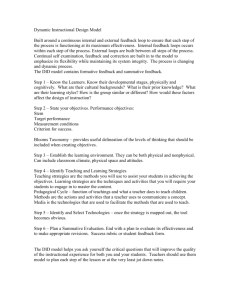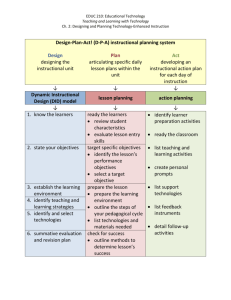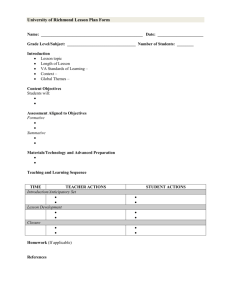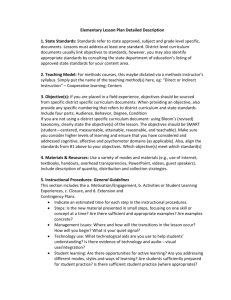course introduction - Missouri Center for Career Education
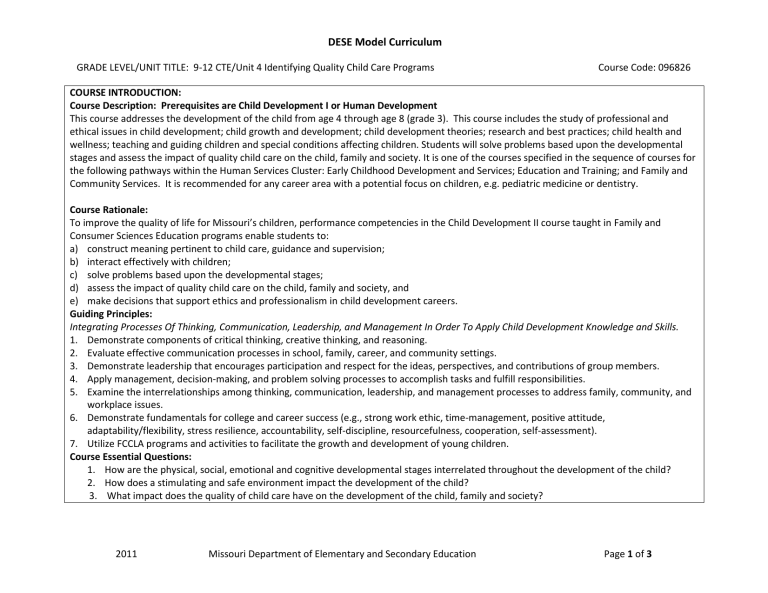
DESE Model Curriculum
GRADE LEVEL/UNIT TITLE: 9-12 CTE/Unit 4 Identifying Quality Child Care Programs Course Code: 096826
COURSE INTRODUCTION:
Course Description: Prerequisites are Child Development I or Human Development
This course addresses the development of the child from age 4 through age 8 (grade 3). This course includes the study of professional and ethical issues in child development; child growth and development; child development theories; research and best practices; child health and wellness; teaching and guiding children and special conditions affecting children. Students will solve problems based upon the developmental stages and assess the impact of quality child care on the child, family and society. It is one of the courses specified in the sequence of courses for the following pathways within the Human Services Cluster: Early Childhood Development and Services; Education and Training; and Family and
Community Services. It is recommended for any career area with a potential focus on children, e.g. pediatric medicine or dentistry.
Course Rationale:
To improve the quality of life for Missouri’s children, performance competencies in the Child Development II course taught in Family and
Consumer Sciences Education programs enable students to: a) construct meaning pertinent to child care, guidance and supervision; b) interact effectively with children; c) solve problems based upon the developmental stages; d) assess the impact of quality child care on the child, family and society, and e) make decisions that support ethics and professionalism in child development careers.
Guiding Principles:
Integrating Processes Of Thinking, Communication, Leadership, and Management In Order To Apply Child Development Knowledge and Skills.
1.
Demonstrate components of critical thinking, creative thinking, and reasoning.
2.
Evaluate effective communication processes in school, family, career, and community settings.
3.
Demonstrate leadership that encourages participation and respect for the ideas, perspectives, and contributions of group members.
4.
Apply management, decision-making, and problem solving processes to accomplish tasks and fulfill responsibilities.
5.
Examine the interrelationships among thinking, communication, leadership, and management processes to address family, community, and workplace issues.
6.
Demonstrate fundamentals for college and career success (e.g., strong work ethic, time-management, positive attitude, adaptability/flexibility, stress resilience, accountability, self-discipline, resourcefulness, cooperation, self-assessment).
7.
Utilize FCCLA programs and activities to facilitate the growth and development of young children.
Course Essential Questions:
1.
How are the physical, social, emotional and cognitive developmental stages interrelated throughout the development of the child?
2.
How does a stimulating and safe environment impact the development of the child?
3. What impact does the quality of child care have on the development of the child, family and society?
2011 Missouri Department of Elementary and Secondary Education Page 1 of 3
DESE Model Curriculum
GRADE LEVEL/UNIT TITLE: 9-12 CTE/Unit 4 Identifying Quality Child Care Programs Course Code: 096826
UNIT DESCRIPTION: Unit 4 – IDENTIFYING QUALITY CHILD CARE PROGRAMS
Students will review components of quality childcare and identify barriers to obtaining quality care.
SUGGESTED UNIT TIMELINE: 2 class periods of 90 minutes each
CLASS PERIOD (min.): 90 minute blocks
ESSENTIAL QUESTIONS:
1.
What does a quality childcare program look like?
ESSENTIAL MEASURABLE LEARNING OBJECTIVES CROSSWALK TO STANDARDS
CCSS ELA
Grade Level
NSFCSE DOK
1.
Identify components of and barriers to quality child care programs.
2.
Identify criteria for selecting quality child care programs (e.g., quality, affordability, access, curriculum).
W.9-10.2
W.11-12.2
W.9-10.2
W.11-12.2
15.2.5
15.2.5
3
3
ASSESSMENT DESCRIPTIONS*: (Write a brief overview here. Identify Formative/Summative. Actual assessments will be accessed by a link to PDF file or Word doc. )
SUMMATIVE ASSESSSMENT_1_Unit Test
SUMMATIVE ASSESSMENT_1_Unit Test Key
*Attach Unit Summative Assessment, including Scoring Guides/Scoring Keys/Alignment Codes and DOK Levels for all items. Label each assessment according to the unit descriptions above ( i.e., Grade Level/Course Title/Course Code, Unit #.)
Obj. # INSTRUCTIONAL STRATEGIES (research-based): (Teacher Methods)
2011 Missouri Department of Elementary and Secondary Education Page 2 of 3
DESE Model Curriculum
GRADE LEVEL/UNIT TITLE: 9-12 CTE/Unit 4 Identifying Quality Child Care Programs Course Code: 096826
1
2
1.
Instructional Strategy_1_Components of and Barriers to Quality Child Care
Teacher will show a scene from “Daddy Daycare” movie which portrays several not quality child care program options. Next, the teacher will lead the class is a PowerPoint review of the characteristics of quality childcare programs. After the review, the teacher will continue in the PowerPoint a discussion of Barriers to Quality Child Care. The teacher will then assign Instructional
Activity 1.The teacher may or may not choose to collect and grade this instructional activity.
1
2
2.
Instructional Strategy_2_Summative Assessment_1_Unit Test Key
Teacher will provide the students with a copy of the Unit Test
Obj. # INSTRUCTIONAL ACTIVITIES: (What Students Do)
1
2
1
2
1.
Instructional Activity_1_Barrier Scenario
After participating in a class discussion and PowerPoint on the characteristics and barriers to Quality Child Care; students will be assigned a “barrier” and will work with a partner to create a written scenario that portrays a family struggling to find quality child care. They will later share the scenario with another group who will look for possible solutions to the problem.
2.
Instructional Activity_2_Summative Assessment_1_Unit Test
The students will take the Unit Test and turn in to the teacher for grading.
UNIT RESOURCES: (include internet addresses for linking)
“Daddy Day Care” (2003). Movie starring Eddie Murphy. Show clip from Chapter/Scene 6 as an introductory Set activity.
2011 Missouri Department of Elementary and Secondary Education Page 3 of 3

